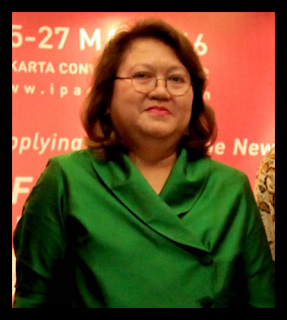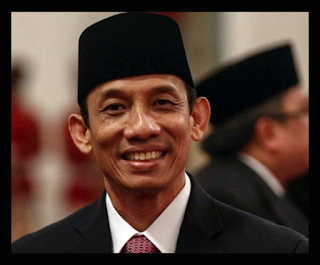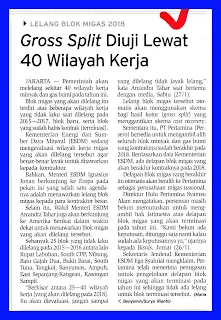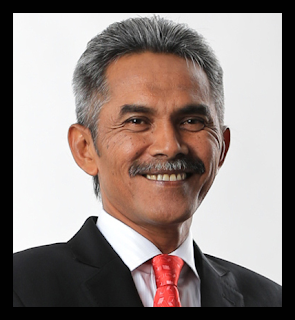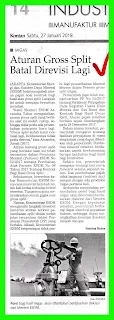The government plans to auction off 25-40 Working Areas (WK) of Oil and Gas (oil and gas) starting mid-February. To promote the auction and to socialize the gross split scheme to be applied in the oil and gas contract, the government conducts roadshows to a number of countries.
"We are targeting the February 17-18 auction, amounting to 25-40 oil and gas fields. Some are coming from the 2016 and 2017 remaining auctions, also from 2015. Of the voluntarily returned and terminated blocks, "said Deputy Minister of Energy and Mineral Resources (ESDM) Arcandra Tahar.
Starting in January 2017, the government changed the scheme of production sharing contract (PSC) on new oil and gas contracts. If previously used is a cost recovery scheme then it is applied in the new rules of gross split scheme.
According to Arcandra Tahar, it will evaluate WK to be quite feasible to be auctioned.
"So, the number of WK is still the range, but if 25 WK I have confidence can," he stressed.
Asked whether the possibility of such auction is interested investors, Arcandra admitted his side can not be sure of it.
"Whether it will be sold or not, there is no guarantee. But we hope this is the momentum. Some companies have also come to the government to express their interest. It just needs enlightenment about the gross split, "he said.
Therefore, the gross split scheme is a challenge for the government to socialize. To promote the auction and gross split system, ESDM Minister Ignatius Jonan traveled to several countries, while he will visit the United States (US). He added that the government also ensures the company that follows the auction will be a credible company to avoid the 'stealth' company.
"We will check, especially regarding three things, namely capital, technology, and human resources. This is to avoid signals that the auctioned WK will be in demand by the company is not credible, "he said.
Repsol Exploracion SA
Arcandra Tahar also revealed, five WKs that have been auctioned before will be announced later this month. The five WKs are the Andaman I Block of interest to Mubadala Petroleum (SE Asia) Ltd, the Andaman II Block is interested in Repsol Exploracion SA, EMP Tbk and Premier Oil Far East Ltd Consortium and Mubadala Petroleum (SE Asia) & Kris Energy Others, the Peacock- Lampung is interested in PT Tansri Madjid Energy, Block Pekawai interested PT Saka Energy Indonesia, and West Yamdena Block interested PT
Saka Energi Indonesia.
Saka Energi Indonesia.
To support the investment, according to the Deputy Minister of Energy and Mineral Resources, the government also made a number of improvements, especially the issue of licensing and security stability.
Become an Indicator
Meanwhile, Executive Director of ReforMiner Institute Komaidi Notonegoro considered that the gross split scheme is very good, because there is no longer cost recovery cost for the country. In addition, the state can further simplify the projected amount of revenue of each oil and gas block, because all costs are borne by the contractor. Komaidi reminded, gross split is a new concept or scheme to replace the concept that has been applied for years. That is why incentives should be made as attractive to contractors as possible.
"If the incentives are not interested contractors, the oil and gas field is not developed," he said.
The government also needs to see the provisions imposed by other countries as a comparison. However, Komaidi sees there is a tremendous serious effort from the government to create a favorable investment climate. Evidently some input from the contractor is accommodated. For example, when the contractor objected to the tax, the ESDM Ministry immediately coordinated with the Ministry of Finance.
With regard to the auction of oil and gas blocks in mid-February, Komaidi said, it could be one of the indicators whether the existing gross split is good enough and attractive to investors. Beginning in January 2017 Beleid gross split is included in Regulation of the Minister of Energy and Mineral Resources. 8 of 2017 on the Gross Split Contract issued in January 2017. The Ministerial Regulation was subsequently revised through Minister of Energy and Mineral Resources Regulation No. 52 of 2017 which was issued in September last year.
The Government subsequently issued Government Regulation (PP) No. 53 of 2017 on Tax Treatment on Cooperation Contracts of Gross Sharing Scheme (Gross Split), at the end of last year. Along with the issuance of Government Regulation, the government decided to close the oil and gas block auction on December 29, 2017.
In the gross split scheme, the cost component is no longer a burden to the state, as in the cost recovery scheme, but rather the burden of investors or contractors. Thus, the country is free from various risks and has more certainty.
For example, when using a cost recovery scheme, profit share for the country compared to investors is 85:15 for oil and 7 0:30 for gas. However, the scheme incorporates cost components that the state should replace. Profit sharing is only calculated after the cost of oil and gas projects is divided between the two countries and investors.
Based on Government Regulation No. 53/2017, the government provides a number of fiscal incentives in the gross split scheme, among which oil and gas companies are given a 10-year tax loss carry forward and indirect tax exemption.
Article 18 Paragraph 2 PP 53/2017 states, the taxable income for the contractor is calculated on the basis of net income less compensation for losses. Other incentives are provided for in Articles 25-27. In Article 25 mentioned, there are fiscal facilities that can be obtained by the contractor at the exploration and exploitation stage until the start of production.
First, the exemption of import duty on imported goods (import duties) used during the operation. Second, the reduction of the land and building tax (PBB) is 100% of the tax payable. Subsequent fiscal incentives are the absence of value added tax levies (VAT) or sales tax on luxury goods (PPnBM) payable in connection with the acquisition of taxable goods or services, import of taxable goods, the utilization of intangible taxable goods from outside the customs area within the area customs and / or utilization of taxable services from outside customs areas within the customs areas used in the framework of petroleum operations.
The last fiscal incentive is not the collection of income tax (PPh) of Article 22 on the import of goods that have obtained facilities of exemption from levies. Government Regulation 53/2017 also states, operating costs covering exploration, exploitation and other categories that have been issued can be calculated as a deduction Taxable income.
According to the records, the government has once again extended the auction of the first phase of oil and gas blocks in 2017. The oil and gas block auction continues to be postponed due to awaiting the issuance of a Government Regulation governing the taxation of gross split oil and gas contracts.
IN INDONESIA
Februari, Pemerintah Lelang 25-40 Blok Migas
Pemerintah berencana melelang 25-40 Wilayah Kerja (WK) Minyak dan Gas bumi (migas) mulai pertengahan Februari mendatang. Untuk mempromosikan lelang dan menyosialisasikan skema bagi hasil kotor (gross split) yang akan diterapkan dalam kontrak migas tersebut, pemerintah melakukan lawatan (roadshow) ke sejumlah negara.
“Kami targetkan lelang tanggal 17-18 Februari, jumlahnya berkisar 25-40 lapangan migas. Ada yang berasal dari lelang tahun 2016 dan 2017 yang masih tersisa, juga dari 2015. Dari blok yang dikembalikan secara sukarela maupun yang terminasi,” kata Wakil Menteri Energi dan Sumber Daya Mineral (ESDM) Arcandra Tahar.
Mulai Januari 2017, pemerintah mengubah skema kontrak bagi hasil (production sharing contract/ PSC) pada kontrak-kontrak baru migas. Jika yang digunakan sebelumnya adalah skema biaya yang dapat dikembalikan (cost recovery) maka yang diterapkan dalam aturan baru yaitu skema gross split.
Menurut Arcandra Tahar, pihaknya akan mengevaluasi WK agar cukup layak untuk dilelang.
“Jadi, jumlah WK masih kisaran, tapi kalau 25 WK saya punya keyakinan bisa,” tegas dia.
Saat ditanya apakah kemungkinan lelang tersebut diminati investor, Arcandra mengaku pihaknya tidak bisa memastikan hal tersebut.
“Apakah akan laku atau tidak, tidak ada jaminan. Tapi kami berharap ini momentumnya. Beberapa perusahaan juga sudah datang ke pemerintah untuk menyatakan minatnya. Hanya saja butuh pencerahan tentang gross split,” papar dia.
Karena itu, skema gross split menjadi tantangan tersendiri bagi pemerintah untuk menyosialisasikan. Untuk mempromosikan lelang dan sistem gross split, Menteri ESDM Ignasius Jonan berkunjung ke sejumlah negara, sedangkan dirinya akan mengunjungi Amerika Serikat (AS). Dia menambahkan, pemerintah juga memastikan perusahaan yang mengikuti lelang nantinya merupakan perusahaan yang kredibel untuk menghindari perusahaan ‘siluman’.
“Kami akan cek, terutama menyangkut tiga hal, yakni permodalan, teknologi, dan SDM. Ini untuk menghindari sinyalemen bahwa WK yang dilelang akan diminati oleh perusahaan tidak kredibel,” kata dia.
Arcandra Tahar juga mengungkapkan, lima WK yang sudah dilelang sebelumnya akan diumumkan akhir bulan ini. Kelima WK tersebut adalah Blok Andaman I yang diminati Mubadala Petroleum (SE Asia) Ltd, Blok Andaman II diminati Repsol Exploracion SA, EMP Tbk, dan Konsorsium Premier Oil Far East Ltd serta Mubadala Petroleum (SE Asia) & Kris Energy Lainnya yaitu Blok Merak-Lampung yang diminati PT Tansri Madjid Energy, Blok Pekawai diminati PT Saka Energi Indonesia, dan Blok West Yamdena diminati PT
Saka Energi Indonesia.
Untuk menunjang investasi, menurut Wakil Menteri ESDM, pemerintah juga melakukan sejumlah perbaikan, terutama masalah perizinan dan stabilitas keamanan.
Menjadi Indikator
Sementara itu, Direktur Eksekutif ReforMiner Institute Komaidi Notonegoro menilai bahwa skema gross split sangat bagus, karena tidak ada lagi beban cost recovery bagi negara. Selain itu, negara bisa lebih menyederhanakan proyeksi jumlah penerimaan dari setiap blok migas, karena segala biaya ditanggung oleh kontraktor. Komaidi mengingatkan, gross split merupakan konsep atau skema baru untuk menggantikan konsep yang sudah bertahun-tahun diberlakukan. Itu sebabnya, insentif harus dibuat semenarik mungkin bagi kontraktor.
“Kalau insentif yang ada tidak diminati kontraktor maka lapangan migas itu malah tidak dikembangkan,” tutur dia.
Pemerintah pun perlu melihat ketentuan yang diberlakukan negara lain sebagai komparasi. Namun, Komaidi melihat terdapat upaya serius yang luar biasa dari pemerintah untuk menciptakan iklim investasi yang baik. Terbukti beberapa masukan dari kontraktor diakomodasi. Contohnya saat kontraktor keberatan mengenai pajak, Kementerian ESDM segera berkoordinasi dengan Kementerian Keuangan.
Berkenaan dengan akan dilakukannya lelang blok migas pada pertengahan Februari mendatang, Komaidi mengemukakan, hal itu bisa dijadikan salah satu indikator apakah ketentuan gross split yang ada saat ini sudah cukup baik dan menarik bagi investor.
Mulai Januari 2017 Beleid gross split ada dalam Peraturan Menteri ESDM No. 8 Tahun 2017 tentang Kontrak Bagi Hasil Kotor (Gross Split) yang dikeluarkan pada Januari 2017. Peraturan Menteri tersebut kemudian direvisi melalui Peraturan Menteri ESDM No 52 Tahun 2017 yang dikaluarkan pada September tahun silam.
Pemerintah selanjutnya menerbitkan Peraturan Pemerintah (PP) Nomor 53 Tahun 2017 tentang Perlakuan Pajak pada Kontrak Kerja Sama Skema Bagi Hasil Kotor (Gross Split), pada akhir tahun lalu. Bersamaan dengan terbitnya Peraturan Pemerintah tersebut, pemerintah memutuskan untuk menutup lelang blok migas pada 29 Desember 2017.
Dalam skema gross split, komponen biaya tidak lagi menjadi beban negara, seperti dalam skema cost recovery, melainkan menjadi beban investor atau kontraktor. Dengan demikian, negara terbebas dari berbagai risiko dan lebih memiliki kepastian.
Sebagai contoh, ketika menggunakan skema cost recovery, bagi hasil untuk negara dibanding investor sebesar 85:15 untuk minyak dan 7 0:30 untuk gas. Namun, skema tersebut memasukkan komponen biaya yang harus diganti negara. Bagi hasil tersebut baru dihitung setelah biaya proyek migas dibagi dua antara negara dan investor.
Berdasarkan Peraturan Pemerintah nomor 53/2017, pemerintah memberikan sejumlah insentif fiskal dalam skema gross split, di antaranya perusahaan migas memperoleh penangguhan pembayaran pajak penghasilan (tax loss carry forward) selama 10 tahun dan pembebasan pajak-pajak tidak langsung.
Pasal 18 Ayat 2 PP 53/ 2017 menyatakan, penghasilan kena pajak bagi kontraktor dihitung berdasarkan penghasilan neto dikurangi kompensasi kerugian. Insentif lainnya diatur Pasal 25-27. Dalam Pasal 25 disebutkan, terdapat fasilitas fiskal yang bisa diperoleh kontraktor pada tahap eksplorasi dan eksploitasi sampai mulai produksi.
Pertama, pembebasan pungutan bea masuk atas impor barang (BM impor) yang digunakan selama kegiatan operasi. Kedua, pengurangan pajak bumi dan bangunan (PBB) sebesar 100% dari pajak terutang. Insentif fiskal selanjutnya adalah tidak adanya pungutan pajak pertambahan nilai (PPN) atau pajak penjualan atas barang mewah (PPnBM) terutang sehubungan dengan perolehan barang atau jasa kena pajak, impor barang kena pajak, pemanfaatan barang kena pajak tidak berwujud dari luar daerah pabean di dalam daerah pabean dan atau pemanfaatan jasa kena pajak dari luar daerah pabean di dalam daerah pabean yang digunakan dalam rangka operasi perminyakan.
Insentif fiskal yang terakhir yaitu tidak dilakukannya pemungutan pajak penghasilan (PPh) Pasal 22 atas impor barang yang telah memperoleh fasilitas pembebasan dari pungutan BM. Peraturan Pemerintah 53/ 2017 juga menyatakan, biaya operasi yang mencakup kegiatan eksplorasi, eksploitasi, dan kategori lainnya yang telah dikeluarkan dapat diperhitungkan sebagai pengurang penghasilan kena pajak.
Berdasarkan catatan, sudah kali ketiga pemerintah memperpanjang masa lelang blok migas tahap pertama pada 2017. Lelang blok migas terus ditunda penutupannya karena menunggu diterbitkannya Peraturan Pemerintah yang mengatur perpajakan kontrak migas gross split.
Investor Daily, Page-1, Monday, Jan 29, 2018








